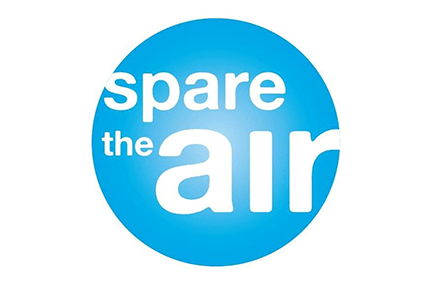SAN FRANCISCO – The Bay Area Air Quality Management District is issuing the winter season’s first Spare the Air Alert for Friday, November 25, which bans burning wood, manufactured fire logs or any other solid fuel, both indoors and outdoors.
Smoke from increased wood burning combined with light winds and low temperatures is expected to cause unhealthy air quality. High pressure over northern California will act like a lid, trapping smoke at ground level. Offshore winds may also transport air pollution from the Central Valley into the Bay Area.
“Smoke from residential wood burning is expected to reach unhealthy levels this holiday weekend,” said Sharon Landers, interim executive officer of the Air District. “Residents can help protect the respiratory health of their families and communities by refraining from wood burning — the number one source of wintertime air pollution in the Bay Area.”
It is illegal for Bay Area residents and businesses to use their fireplaces, wood stoves, pellet stoves, outdoor fire pits or any other wood-burning devices during a Spare the Air Alert for fine particle pollution. Exemptions are available for homes without permanently installed heating, where wood stoves or fireplaces are the only source of heat. Anyone whose sole source of heat is a wood-burning device must use an EPA-certified or pellet-fueled device that is registered with the Air District to qualify for an exemption. An open-hearth fireplace no longer qualifies for an exemption.
Like cigarette smoke, wood smoke contains carcinogenic substances, such as particulate matter and carbon monoxide, which are harmful when inhaled. Exposure to wood smoke has been linked to serious respiratory illnesses and increased risk of heart attacks. The fine particulate pollution in wood smoke is especially harmful for children, the elderly and those with respiratory conditions.
Low temperatures and calm winds trap smoke from wood burning around homes and increases fine particulate pollution buildup indoors and outdoors. Natural gas, propane or electric fireplaces are allowed during Spare the Air Alerts.
The Air District may call Spare the Air Alerts for fine particle pollution up to three days in advance to prevent air pollution from exceeding federal standards. During an alert, the use of wood burning devices such as fireplaces, pellet stoves, wood stoves and outdoor fire pits is illegal. In San Francisco, the National Park Service also prohibits recreational beach fires at Ocean Beach in Golden Gate National Recreation Area through the end of February.
Bay Area residents can find out if a Spare the Air Alert is in effect by:
- Signing up for text alerts. To sign up, text the word “START” to the number 817-57
- Calling 1-877-4NO-BURN
- Visiting www.sparetheair.org or www.baaqmd.gov
- Signing up for automatic e-mail AirAlerts at www.sparetheair.org/alerts
- Signing up for automatic phone alerts at www.sparetheair.org/alerts
- Downloading the Spare the Air iPhone or Android app
First-time violators of the Wood Burning Rule are encouraged to take a wood smoke awareness course to learn more about the health impacts from wood smoke and the weather conditions that lead to unhealthy air quality in the winter. Those violators who choose not to take the course will receive a $100 ticket. Second violations are subject to a $500 ticket, with the ticket amount increasing for any subsequent violations.
There are also prohibitions on excessive smoke and burning garbage and other harmful materials like junk mail, plastic, wood pallets and more in fireplaces and wood stoves. Residents concerned about wood smoke pollution may call 1-877-4NO-BURN or visit www.baaqmd.gov to file a complaint or to get more information.
The Bay Area Air Quality Management District is the regional agency responsible for protecting air quality in the nine county Bay Area. Connect with the Air District via Twitter, Facebook and YouTube.
For more information about Spare the Air, visit www.sparetheair.org.
For more information on the U.S. EPA’s AIRNow Program, visit http://www.airnow.gov.

